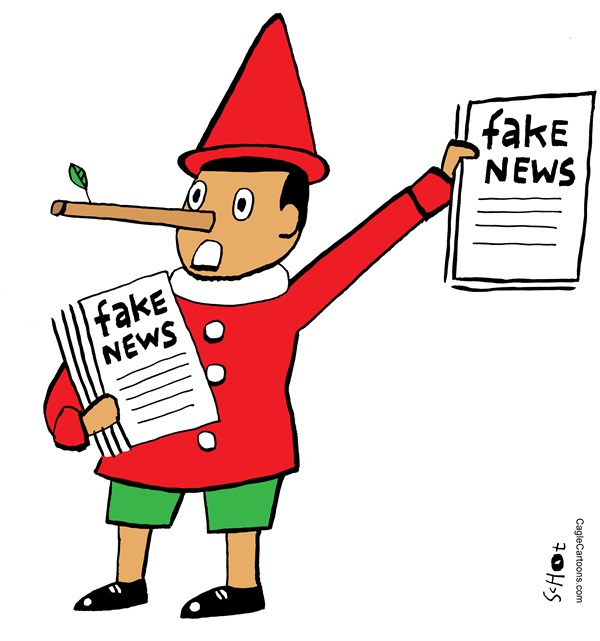
A Colorado newspaper is threatening to file a libel suit against a state lawmaker who accused the publication of printing "fake news," setting the stage for a possible legal battle that could test the definition of the most overused phrase in Trump-era politics.
The episode began last week, when Colorado state Sen. Ray Scott, a Republican, claimed in a tweet that the Daily Sentinel of Grand Junction had published "a fake news story" about a bill that would change the state's public records law. Daily Sentinel publisher Jay Seaton, an attorney, wrote over the weekend that "Sen. Scott has defamed this company and me as its leader."
"To borrow a phrase from another famous Twitter user, I'll see you in court," he added.
Ray Scott tweeted: We have our own fake news in Grand Junction.. The very liberal GJ Sentinel is attempting to apply (more: https://t.co/VYmpfgM6X9 )
![]()
In an interview, Seaton said he would take a couple weeks to cool off before making a final decision about whether to file a suit but insisted that he was not merely engaging in tough talk.
"This was libelous. This was a statement of fact - that the Daily Sentinel is a purveyor of fake news," Seaton said. "That goes to the heart of what we do. So my legal analysis is this is actionable. I have seen this [media] industry sort of sit back and take attack after attack, both nationally and here. Why should this industry act differently from any other industry? So I am serious."
Scott said in a statement to The Washington Post that he stands by his tweet and believes that his use of the term "fake news" was appropriate.
"We all have our own definitions of 'fake news,' " the senator said. "What one finds, when one looks closely at the issue, is that it's a subjective, eye-of-the-beholder thing."
"Fake," being a word and all, does have an objective definition, however. According to Merriam-Webster, it means "counterfeit," as in "made in imitation of something else with intent to deceive." It's a look-it-up-in-the-dictionary thing.
Therefore - taken literally - Scott claimed that the Daily Sentinel printed an imitation of an article, not a real one, with intent to deceive its readers. That is what a bunch of teenagers in Macedonia did during the presidential campaign when they fabricated stories about Donald Trump and Hillary Clinton and tried to pass them off as genuine works of journalism. That is not what the Daily Sentinel did.
But Scott raises an important point: President Donald Trump and other politicians have hijacked the term "fake news" and used it as an all-purpose insult to be slapped on any media coverage they don't like. Their efforts to redefine - or perhaps undefine - the phrase have been so effective that a court might give Scott a pass, said John A. Francis, a visiting scholar in residence at the University of Colorado Law School and an expert in First Amendment law.
"The court would look at how the term is perceived by readers," Francis said. "It's become such a generic epithet that it tends to be seen as a statement of opinion. That would be a big factor in a judge saying, ' "Fake news" has become kind of a description of opinion and disagreement, more than a specific allegation of falsehood.' "
In other words, "fake news" - as the term is used in politics and understood by voters - doesn't always mean what it actually means. And a court would take that into account.
It is, of course, highly unusual for a news outlet to be the plaintiff in a defamation case. More often, publications must defend themselves against libel claims made by people who object to their coverage.
Trump campaigned on a proposal to weaken libel protections for journalists, "so when they write purposely negative and horrible and false articles, we can sue them and win lots of money."
In his statement to The Post, Scott accused the Daily Sentinel of "drawing false conclusions without first checking for countervailing facts or evidence" and said the editorial "seeks to impugn my actions and motives."
In reality, the newspaper did no such thing. The editorial in question argued in favor of a bill that would require public records that are maintained electronically to be provided to news outlets (or anyone who requests them) in electronic form. Currently, government agencies in Colorado can deliberately make their records harder for journalists to search by supplying them on paper - while charging for every page.
The Daily Sentinel's editorial did not mention Scott until the eighth paragraph, where it said this: "The State, Veterans and Military Affairs Committee was supposed to consider the bill on Monday, but Republican Sen. Ray Scott of Grand Junction, who chairs the committee, said it wouldn't be heard as scheduled."
The only other reference to Scott came at the end of the editorial:
![]()
We call on our own Sen. Scott to announce a new committee hearing date and move this bill forward. ...
Sen. Scott often stresses the importance of the Taxpayer's Bill of Rights, which gives citizens a voice on fiscal policy by requiring voter approval of any tax hike. Easy access to public information should be no less a priority for lawmakers - especially when it so often informs voters on the very issues they're called upon to decide.
![]()
That's it. There was no conclusion - false or otherwise - about Scott's motive for canceling the hearing.
Seaton said he is tired of seeing responsible reporting mischaracterized and attacked as "fake."
"That undermines our role under the First Amendment. I've seen that happen nationally, and there's been a whole lot of confusion about what's real information and what's false information. I think our industry, which is a purveyor of real information - at least to the extent that we possibly can - needs to stand up.
"I don't think continuing to report on the issue is the only answer. It is an answer, but I think there are other options that we as an industry need to look at."
Previously:
• 01/16/17/ He's with her: Trump revives Hillary's idea about kicking media out of White House
• 10/27/16: You won't believe how much Trump made for his media enemies
• 10/23/16: Trump TV already exists. It's called Right Side Broadcasting
• 08/15/16: If Donald Trump ever cleans up his act, Hillary Clinton could have a problem
• 06/06/16: Hillary makes her Second Amendment problem public
• 05/20/16: Lib pundits blame Deb Schultz, not Sanders, for Dems' division
• 05/05/16: Here's what we know about the big Donald Trump-Megyn Kelly interview
• 05/05/16: 12 of the most misguided media predictions about Donald Trump
• 04/28/16: Trump thinks it's time to label him the 'presumptive nominee.' Nope.
• 04/25/16: The 'nasty effect,' and why Donald Trump supporters mistrust the media
• 03/07/16: Even Trump's favorite TV hosts, Scarborough and Bill O', can't avoid feuding with him
• 03/04/16: Mitt Romney: Media darling?
• 03/02/16: Donald Trump: The King of the 'No Comment'
• 02/29/16: Why this new media narrative could actually, for once, hurt Donald Trump
• 02/26/16: Why haven't Trump's tax returns, Clinton's speech gotten the Romney treatment?
• 02/08/16: In media coverage of Chelsea Clinton, the kid gloves are still on


 Contact The Editor
Contact The Editor
 Articles By This Author
Articles By This Author